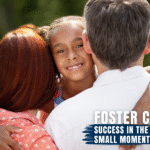Listen to Episode 19 of the Vigilant Voices™ podcast, YOU Can Make the Holidays Bright.
Kristin Blalock: Hello, listeners! Welcome to the Vigilant Voices podcast.
Jeannine Panzera: This episode comes to you right in the middle of the holiday season. We hope that this is a time of cheer for you…
K: but understand if it is not. Because while the holidays can be joyful, they can also be a time of stress, grief, loneliness, unmet expectations and other maybe not so cheerful feelings.
J: Right. We’re going to talk about this, but whether the holidays are a happy or a challenging time for you, we know that they are often full of big emotions. And that is especially true for the children we serve at Henrico CASA, which stands for Court Appointed Special Advocates. Once again, today, as a reminder, we are focusing on knowing about the challenges facing children and families in order to ensure that no child faces additional abuse, neglect or trauma.
K: That is absolutely right. And as much as we hate to think about it, abuse, neglect and trauma do happen during the holiday season.
J: Unfortunately, that’s very much true. And so I think perhaps, Kristin, we can talk about a couple of things. I have a couple questions in mind. Why are the holidays difficult for so many of the youth that we serve? And then maybe part two of that is: what can we do to best support them through the holiday season?
K: Sure. And they’re both great questions and like anything, it totally depends on the child, the family and their situation. But before we go into that, Jeannine, I do have a case story to share. It was actually conveyed to us by one of the judges with Henrico County’s Juvenile and Domestic Relations Court. This judge was explaining the role of Court Appointed Special Advocates to a group of our volunteers. And she was explaining that the observations, the reports, the recommendations that we provide to judges like her are so important. And so in doing so, she recounted a family that still weighed heavily on her heart because they came before her in the courtroom on a motion regarding the children being removed from their home of origin… and they came to her courtroom just a few days before Christmas.
J: That’s sad and a tough situation for many reasons.
K: Yeah. And clearly the timing and the contrast of this situation versus what you hope would be holiday cheer was just so upsetting to this judge. She knew that the children had already lived through traumatic experiences and the decision that she felt was in their best interest, to be separated from their birth parents for their own safety, would likely also add to their trauma.
J: I feel for our judges, who are amazing, but they are tasked with making very difficult decisions. They’re not easy. And the reality in this situation was that I think she knew that this decision that she was going to make would clearly impact how the children feel about probably holidays to come in the future.
K: Right. Yeah. We see a lot of reasons why this time of year can be emotionally challenging for some, like these children. The holidays specifically bring back a traumatic memory. This is the time of year, when maybe so and so drinks more heavily and becomes abusive or this is the time of year that our family always visits uncle so and so, who makes me feel uncomfortable.
J: Right. And then there are additional feelings for children who have been removed from their homes, like the children that we serve living in foster care. The holidays can initiate and bring up maybe even a sense of mourning because they’re missing things, right. Family, friends, the house that they knew, the traditions that they used to celebrate.
K: For sure. I saw that this informal study conducted with the Foster Club found that 82% of youth living in foster care miss their families during the holidays. And a lot of these kids probably know that maybe they’re safer, but they still miss their families. Children like these, they have lost relationships, lost traditions, and now they’re navigating new unfamiliar relationships, new homes, new traditions that may be completely different than what they were used to. It’s a major loss for them.
J: So we’re talking about children because that is our primary focus in terms of who we serve, but think we should also point out that adults mourn these things too.
K: They do.
J: When a youth turns 18, it doesn’t mean that they’re going to magically love the holidays again. And so we probably all know individuals who feel sadness and grief for many years to come around the holidays. And it might lessen over time, but it probably never fully goes away depending on what those memories evoke and what feelings.
K: Right, that’s so true. During the holiday season, it can seem like everybody else is happy and cheerful and surrounded by family. And so if that’s not how you’re feeling, you can see how it really intensifies feelings of loss and can lead to stronger feelings of loneliness or isolation.
J: Right. And those emotions and maybe expectations of what you hope, they just seem bigger during the holidays. Right. And then there’s more opportunity then for those sort of big sways in terms of how then we might feel let down based on our expectations.
K: Yeah, that definitely seems to be the case. And just practically during the holidays, our schedules and routines are off. So we all know that most children and teens do better when they’re on a routine. And so having parties at school or being off on break gets us out of that routine. And that can lead to big swings in emotions too. One example that comes to my mind is when there’s no nap schedule, right.
J: And I mean, I think we all like a holiday party, right, but then there’s too much caffeine or there’s too many sweets and treats and cookies, or just the stress of being cooped up with relatives and just some of those family dynamics.
K: Right. It sometimes feels like it’s all just a meltdown waiting to happen for the kids and for the adults sometimes.
J: That is true. We all have probably had spirited family discussions around the table. But I think, as we often say, if you know better, then you do better. So I think then, okay, how can we better support the kids and families through the holidays that we’re working with that may be struggling?
K: Yeah. And I think a good way to maybe do this is to brainstorm a list of holiday do’s and don’ts together.
J: Let’s do that.
K: And so I would start off saying, DO PREPARE for the holidays. If you have a child in your life who you anticipate could have a reason to struggle, be prepared. Ask them how they’re feeling about things. Ask them if there’s anything they specifically want or need. And set your own expectations. I know that me, as an adoptive mom, I have to check myself going into the holidays. There’s this picture of what I want the holidays to be for everyone in my family. And then there’s the reality of how it can go, like how it might actually go. And I’ve learned, and my husband helps me remember, to maintain appropriate or maybe more realistic expectations for our kids.
J: I can see that. And that’s a good reminder. And ignoring the potential difficulty is just never going to help anyone. And so maybe part of this is preparing others.
K: Yeah, good point.
J: So giving extended family a little heads up or a little pep talk on what to be aware of how you think a child may react or what to do if they do.
K: Sure. And we’re talking like the holidays are just starting now because it’s that season, but being reminded of tough things can happen really anytime. Like when you’re walking through the store in July and Thanksgiving decorations pop up…
J: It is a huge pet peeve of mine! Time flies too fast! And I feel like we rush it and can’t enjoy the moment when we’re thinking about Christmas in July.
K: But visuals like that can make the big thoughts and feelings and emotions brew in advance of the actual holidays. We can’t predict what might trigger an emotional response from someone who’s experienced trauma like this.
J: Right. And I think then, as a piggyback, to the suggestion of being prepared, I think we should add that we should also respect the child’s feelings. So that would be another do. Like, DO RESPECT. If they don’t want to participate in something, that’s okay, we need to respect that. If they don’t feel comfortable being hugged by relatives, that’s okay. Respect that. If they need a break from all the festivities to go in their room or just kind of escape for a little bit, that’s okay. You should respect that.
K: Yes. No matter how wonderful your holiday vision may be, you can’t force them to see it, feel it, enjoy it. So definitely respect their space and feeling right.
J: And then while respecting them, I think the key is that we really DO NOT MAKE THEM FEEL UNWELCOME.
K: Yeah. And unwittingly so. Listeners, we know that you don’t intend to make someone feel unwelcome.
J: Right. It can be completely unintended. But I think I’ve seen people get caught up in these holiday traditions and then kind of forget how it might feel for someone who’s, like, on the outside. Sure. Let’s see, what’s a fun example. Okay, maybe that historically, in the family, everyone has always worn, like, matching PJs on their holiday morning. But what about the new foster child who has now come into the home, and then they don’t have a pair of pajamas, and even if you get them a cute pair to kind of match, they’re still different than the original everyone else, correct?
K: Another thing that comes to mind is how we decorate. We tend to have family pictures around holiday cards hanging on the fridge, but is this foster child’s photo anywhere?
J: And kids notice those things. I mean, that is the reality. They already feel out of place. They’re in a different environment, and they’re trying to assimilate the best they can. And so then they’re looking for proof of why they don’t belong. And completely unintended, they don’t see themselves anywhere.
K: Exactly. So to make them feel included and to honor their history, which is different than yours, a do that I would put that there is to DO INCORPORATE THEIR TRADITIONS and maybe even their wider family into your holiday plans. Could you have their relatives maybe send them cards? Could you cook one of their favorite holiday meals? Could you attend an event with them at their old school? Could you have them teach you the words to their favorite holiday song?
J: And sometimes it’s not safe, we should say, or healthy to reconnect with relatives or past places. And that should certainly be something to talk with some professionals about what would be best for that child. But if that’s the case, then I think a great suggestion is to DO SOMETHING NEW.
K: Yeah, great idea.
J: Like, start a new tradition that’s just new to everyone in the family. And so I think that way, then no one feels left out because, hey, we’re going to go do something different this year and fun,
K: and hopefully you’re bonding through that, right?
J: And then create something that, if it’s really fun, that can continue, and that becomes a new tradition going forward.
K: I love that.
J: So I think we’ve talked about some great ideas here, and so if we were to distill this down… So our major DON’T was: don’t make someone feel uncomfortable. But what we should DO is we should prepare and set expectations. We should respect a child’s feelings and their boundaries. Definitely we should incorporate the child’s tradition as much as possible and then we should add something new to holiday plans. Yeah. What do we think?
K: I think they are all fabulous. Definitely love all the DO’s. And it’s really about stepping back to remember that it’s pretty difficult to believe in the magic of the season if you’re a child who’s lived through abuse or neglect.
J: Right. And that sort of brings us back, Kristin, to the children in the case story that you shared.
K: Yeah. That holiday clearly did not go as expected for them. And the judge did not weigh her decision lightly, but she knew that their safety was the foremost priority, and so she made decisions to ensure that those children were safe through that holiday season. And I think that weighs on her and she still thinks about it, but it was the choice that had to be made, that had to be enough in that moment.
J: Right. And then moving forward, they’re in that safe environment and hopefully it’s temporary and they can be reunited with their family of origin. But in those moments, then moving forward, we’re helping them heal, helping them find hope.
K: Yeah. Because more than anything, this is a season of hope.
J: And so, listener, we hope that you find joy and hope during this season, even if it is amongst loss, grief or other heavy emotions.
K: Yeah. And that is our call to action for you and for the children in your life. Do something that brings you joy.
J: Reminisce on those good memories. Maybe create a new tradition. Reconnect with someone who is uplifting to you.
K: Yes. And and be grateful for it!







